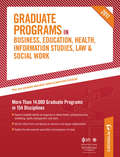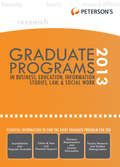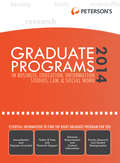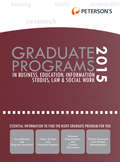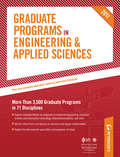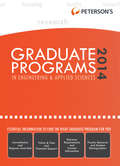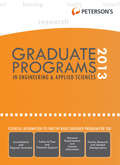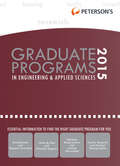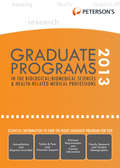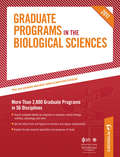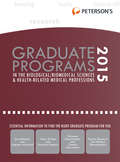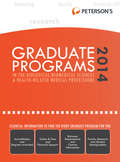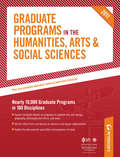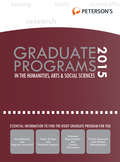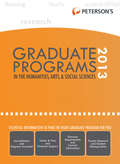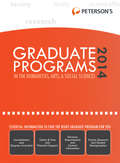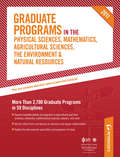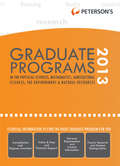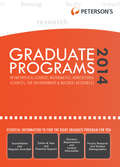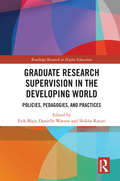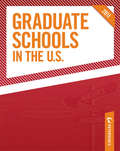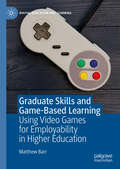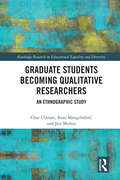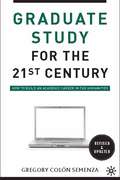- Table View
- List View
Graduate Programs in Business, Education, Health, Information Studies, Law & Social Work 2013 (Grad #6)
by Peterson'sPeterson's Graduate Programs in Business, Education, Health, Information Studies, Law & Social Work 2013 contains a wealth of info on accredited institutions offering graduate degrees in these fields. Up-to-date info, collected through Peterson's Annual Survey of Graduate and Professional Institutions, provides valuable data on degree offerings, professional accreditation, jointly offered degrees, part-time & evening/weekend programs, postbaccalaureate distance degrees, faculty, students, requirements, expenses, financial support, faculty research, and unit head and application contact information. There are helpful links to in-depth descriptions about a specific graduate program or department, faculty members and their research, and more. Also find valuable articles on financial assistance, the graduate admissions process, advice for international and minority students, and facts about accreditation, with a current list of accrediting agencies.
Graduate Programs in Business, Education, Health, Information Studies, Law & Social Work 2013 (Graduate And Professional Programs Ser. #6)
by Peterson'SPeterson's Graduate Programs in Business, Education, Health, Information Studies, Law & Social Work 2013 contains a wealth of info on accredited institutions offering graduate degrees in these fields. Up-to-date info, collected through Peterson's Annual Survey of Graduate and Professional Institutions, provides valuable data on degree offerings, professional accreditation, jointly offered degrees, part-time & evening/weekend programs, postbaccalaureate distance degrees, faculty, students, requirements, expenses, financial support, faculty research, and unit head and application contact information. There are helpful links to in-depth descriptions about a specific graduate program or department, faculty members and their research, and more. Also find valuable articles on financial assistance, the graduate admissions process, advice for international and minority students, and facts about accreditation, with a current list of accrediting agencies.
Graduate Programs in Business, Education, Information Studies, Law & Social Work 2014 (Grad #6)
by Peterson'SPeterson's Graduate Programs in Business, Education, Information Studies, Law & Social Work 2014 contains comprehensive profiles of more than 11,000 graduate programs in disciplines such as, accounting & finance, business administration & management, education, human resources, international business, law, library & information studies, marketing, social work, transportation management, and more. Up-to-date info, collected through Peterson's Annual Survey of Graduate and Professional Institutions, provides valuable data on degree offerings, professional accreditation, jointly offered degrees, part-time & evening/weekend programs, postbaccalaureate distance degrees, faculty, students, requirements, expenses, financial support, faculty research, and unit head and application contact information. There are helpful links to in-depth descriptions about a specific graduate program or department, faculty members and their research, and more. Also find valuable articles on financial assistance, the graduate admissions process, advice for international and minority students, and facts about accreditation, with a current list of accrediting agencies.
Graduate Programs in Business, Education, Information Studies, Law & Social Work 2014 (Grad #6)
by Peterson'sPeterson's Graduate Programs in Business, Education, Information Studies, Law & Social Work 2014 contains comprehensive profiles of more than 11,000 graduate programs in disciplines such as, accounting & finance, business administration & management, education, human resources, international business, law, library & information studies, marketing, social work, transportation management, and more. Up-to-date info, collected through Peterson's Annual Survey of Graduate and Professional Institutions, provides valuable data on degree offerings, professional accreditation, jointly offered degrees, part-time & evening/weekend programs, postbaccalaureate distance degrees, faculty, students, requirements, expenses, financial support, faculty research, and unit head and application contact information. There are helpful links to in-depth descriptions about a specific graduate program or department, faculty members and their research, and more. Also find valuable articles on financial assistance, the graduate admissions process, advice for international and minority students, and facts about accreditation, with a current list of accrediting agencies.
Graduate Programs in Engineering & Applied Sciences 2011
by Peterson'S PublicationsPeterson's Graduate Programs in Engineering & Applied Sciences contains a wealth of information on colleges and universities that offer graduate degrees in the fields of Aerospace/Aeronautical Engineering; Agricultural Engineering & Bioengineering; Architectural Engineering, Biomedical Engineering & Biotechnology; Chemical Engineering; Civil & Environmental Engineering; Computer Science & Information Technology; Electrical & Computer Engineering; Energy & Power engineering; Engineering Design; Engineering Physics; Geological, Mineral/Mining, and Petroleum Engineering; Industrial Engineering; Management of Engineering & Technology; Materials Sciences & Engineering; Mechanical Engineering & Mechanics; Ocean Engineering; Paper & Textile Engineering; and Telecommunications. <P><P> Up-to-date data, collected through Peterson's Annual Survey of Graduate and Professional Institutions, provides valuable information on degree offerings, professional accreditation, jointly offered degrees, part-time and evening/weekend programs, post-baccalaureate distance degrees, faculty, students, degree requirements, entrance requirements, expenses, financial support, faculty research, and unit head and application contact information. <P> As an added bonus, readers will find a helpful "See Close-Up" link to in-depth program descriptions written by some of these institutions. These Close-Ups offer detailed information about the specific program or department, faculty members and their research, and links to the program Web site.<P> In addition, there are valuable articles on financial assistance and support at the graduate level and the graduate admissions process, with special advice for international and minority students. Another article discusses important facts about accreditation and provides a current list of accrediting agencies.
Graduate Programs in Engineering & Applied Sciences 2011 (Grad #5)
by Peterson'sPeterson's Graduate Programs in Engineering & Applied Sciences contains a wealth of information on colleges and universities that offer graduate degrees in the fields of Aerospace/Aeronautical Engineering; Agricultural Engineering & Bioengineering; Architectural Engineering, Biomedical Engineering & Biotechnology; Chemical Engineering; Civil & Environmental Engineering; Computer Science & Information Technology; Electrical & Computer Engineering; Energy & Power engineering; Engineering Design; Engineering Physics; Geological, Mineral/Mining, and Petroleum Engineering; Industrial Engineering; Management of Engineering & Technology; Materials Sciences & Engineering; Mechanical Engineering & Mechanics; Ocean Engineering; Paper & Textile Engineering; and Telecommunications. Up-to-date data, collected through Peterson's Annual Survey of Graduate and Professional Institutions, provides valuable information on degree offerings, professional accreditation, jointly offered degrees, part-time and evening/weekend programs, postbaccalaureate distance degrees, faculty, students, degree requirements, entrance requirements, expenses, financial support, faculty research, and unit head and application contact information. As an added bonus, readers will find a helpful "See Close-Up" link to in-depth program descriptions written by some of these institutions. These Close-Ups offer detailed information about the specific program or department, faculty members and their research, and links to the program Web site. In addition, there are valuable articles on financial assistance and support at the graduate level and the graduate admissions process, with special advice for international and minority students. Another article discusses important facts about accreditation and provides a current list of accrediting agencies.
Graduate Programs in Engineering & Applied Sciences 2013
by Peterson'S PublicationsPeterson's Graduate Programs in Engineering & Applied Sciences 2013 contains comprehensive profiles of more than 3,850 graduate programs in 77 disciplines, including aerospace/aeronautical engineering, agricultural engineering & bioengineering, chemical engineering, civil and environmental engineering, computer science and information technology, electrical and computer engineering, industrial engineering, telecommunications, and more. <P><P> Up-to-date data, collected through Peterson's Annual Survey of Graduate and Professional Institutions, provides valuable information on degree offerings, professional accreditation, jointly offered degrees, part-time and evening/weekend programs, post-baccalaureate distance degrees, faculty, students, requirements, expenses, financial support, faculty research, and unit head and application contact information. <P>Two-page in-depth descriptions provide information about specific graduate programs, schools, or departments, faculty members and their research, and more.<P> There are also valuable articles on financial assistance, the graduate admissions process, advice for international and minority students, and facts about accreditation, with a current list of accrediting agencies.
Graduate Programs in Engineering & Applied Sciences 2015 (Grad #5)
by Peterson'sPeterson's Graduate Programs in Engineering & Applied Sciences 2015 contains comprehensive profiles of more than 3,850 graduate programs in all relevant disciplines-including aerospace/aeronautical engineering, agricultural engineering & bioengineering, chemical engineering, civil and environmental engineering, computer science and information technology, electrical and computer engineering, industrial engineering, telecommunications, and more. Two-page in-depth descriptions, written by featured institutions, offer complete details on a specific graduate program, school, or department as well as information on faculty research. Comprehensive directories list programs in this volume, as well as others in the Peterson's graduate series.
Graduate Programs in the Biological Sciences 2011 (Grad #3)
by Peterson'sPeterson's Graduate Programs in the Biological Sciences contains a wealth of information on colleges and universities that offer graduate/professional degrees in Biological & Biomedical Sciences; Anatomy; Biochemistry; Biophysics; Botany & Plant Biology; Cell, Molecular & Structural Biology; Computational, Systems, & Translational Biology; Ecology, Environmental Biology, & Evolutionary Biology; Entomlogy; Genetics, Developmental Biology, & Reproductive Biology; Marine Biology; Microbiological Sciences; Neuroscience & Neurobiology; Nutrition; Parasitology; Pathology & Pathobiology; Pharmacology & Toxicology; Physiology; and Zoology. Profiled institutions include those in the United States, Canada, and abroad that are accredited by U.S. accrediting agencies. Up-to-date data, collected through Peterson's Annual Survey of Graduate and Professional Institutions, provides valuable information on degree offerings, professional accreditation, jointly offered degrees, part-time and evening/weekend programs, postbaccalaureate distance degrees, faculty, students, degree requirements, entrance requirements, expenses, financial support, faculty research, and unit head and application contact information. Readers will find helpful links to in-depth descriptions that offer additional detailed information about a specific program or department, faculty members and their research, and much more. In addition, there are valuable articles on financial assistance, the graduate admissions process, advice for international and minority students, and facts about accreditation, with a current list of accrediting agencies.
Graduate Programs in the Biological Sciences 2011 (Grad #3)
by Peterson'sPeterson's Graduate Programs in the Biological Sciences contains a wealth of information on colleges and universities that offer graduate/professional degrees in Biological & Biomedical Sciences; Anatomy; Biochemistry; Biophysics; Botany & Plant Biology; Cell, Molecular & Structural Biology; Computational, Systems, & Translational Biology; Ecology, Environmental Biology, & Evolutionary Biology; Entomlogy; Genetics, Developmental Biology, & Reproductive Biology; Marine Biology; Microbiological Sciences; Neuroscience & Neurobiology; Nutrition; Parasitology; Pathology & Pathobiology; Pharmacology & Toxicology; Physiology; and Zoology. Profiled institutions include those in the United States, Canada, and abroad that are accredited by U.S. accrediting agencies. Up-to-date data, collected through Peterson's Annual Survey of Graduate and Professional Institutions, provides valuable information on degree offerings, professional accreditation, jointly offered degrees, part-time and evening/weekend programs, postbaccalaureate distance degrees, faculty, students, degree requirements, entrance requirements, expenses, financial support, faculty research, and unit head and application contact information. Readers will find helpful links to in-depth descriptions that offer additional detailed information about a specific program or department, faculty members and their research, and much more. In addition, there are valuable articles on financial assistance, the graduate admissions process, advice for international and minority students, and facts about accreditation, with a current list of accrediting agencies.
Graduate Programs in the Biological/Biomed Sciences & Health-Related/Med Prof 2015 (Grad #3)
by Peterson'sPeterson's Graduate Programs in the Biological/Biomedical Sciences & Health-Related Medical Professions 2015 contains profiles of 6,750 graduate programs at over 1,200 institutions in the biological/biomedical sciences and health-related/medical professions. Informative data profiles are included for 6,750 graduate programs in every available discipline in the biological and biomedical sciences and health-related medical professions, including facts and figures on accreditation, degree requirements, application deadlines and contact information, financial support, faculty, and student body profiles. Two-page in-depth descriptions, written by featured institutions, offer complete details on specific graduate program, school, or department as well as information on faculty research and the college or university. Comprehensive directories list programs in this volume, as well as others in the graduate series.
Graduate Programs in the Biological/Biomedical Sciences & Health-Related Medical Professions 2014 (Grad #3)
by Peterson'sPeterson's Graduate Programs in the Biological/Biomedical Sciences & Health-Related Medical Professions 2014 contains comprehensive profiles of nearly 6,800 graduate programs in disciplines such as, allied health, biological & biomedical sciences, biophysics, cell, molecular, & structural biology, microbiological sciences, neuroscience & neurobiology, nursing, pharmacy & pharmaceutical sciences, physiology, public health, and more. Up-to-date data, collected through Peterson's Annual Survey of Graduate and Professional Institutions, provides valuable information on degree offerings, professional accreditation, jointly offered degrees, part-time and evening/weekend programs, postbaccalaureate distance degrees, faculty, students, requirements, expenses, financial support, faculty research, and unit head and application contact information. There are helpful links to in-depth descriptions about a specific graduate program or department, faculty members and their research, and more. There are also valuable articles on financial assistance, the graduate admissions process, advice for international and minority students, and facts about accreditation, with a current list of accrediting agencies.
Graduate Programs in the Humanities, Arts & Social Sciences 2011 (Grad #2)
by Peterson'SPeterson's Graduate Programs in the Humanities, Arts & Social Sciences contains a wealth of information on colleges and universities that offer graduate work in Arts & Architecture, the Humanities, Interdisciplinary Studies, and the Social Sciences. Institutions listed include those in the United States, Canada, and abroad that are accredited by U.S. accrediting agencies. Up-to-date data, collected through Peterson's Annual Survey of Graduate and Professional Institutions, provides valuable information on degree offerings, professional accreditation, jointly offered degrees, part-time and evening/weekend programs, postbaccalaureate distance degrees, faculty, students, degree requirements, entrance requirements, expenses, financial support, faculty research, and unit head and application contact information. Readers will find helpful links to in-depth descriptions that offer additional detailed information about a specific program or department, faculty members and their research, and much more. In addition, there are valuable articles on financial assistance, the graduate admissions process, advice for international and minority students, and facts about accreditation, with a current list of accrediting agencies.
Graduate Programs in the Humanities, Arts & Social Sciences 2011 (Grad #2)
by Peterson'sPeterson's Graduate Programs in the Humanities, Arts & Social Sciences contains a wealth of information on colleges and universities that offer graduate work in Arts & Architecture, the Humanities, Interdisciplinary Studies, and the Social Sciences. Institutions listed include those in the United States, Canada, and abroad that are accredited by U.S. accrediting agencies. Up-to-date data, collected through Peterson's Annual Survey of Graduate and Professional Institutions, provides valuable information on degree offerings, professional accreditation, jointly offered degrees, part-time and evening/weekend programs, postbaccalaureate distance degrees, faculty, students, degree requirements, entrance requirements, expenses, financial support, faculty research, and unit head and application contact information. Readers will find helpful links to in-depth descriptions that offer additional detailed information about a specific program or department, faculty members and their research, and much more. In addition, there are valuable articles on financial assistance, the graduate admissions process, advice for international and minority students, and facts about accreditation, with a current list of accrediting agencies.
Graduate Programs in the Humanities, Arts & Social Sciences 2013
by Peterson'S PublicationsPeterson's Graduate Programs in the Humanities, Arts & Social Sciences 2014 contains a wealth of information on accredited institutions offering graduate degrees in these fields.<P><P> Up-to-date data, collected through Peterson's Annual Survey of Graduate and Professional Institutions, provides valuable information on degree offerings, professional accreditation, jointly offered degrees, part-time and evening/weekend programs, post-baccalaureate distance degrees, faculty, students, requirements, expenses, financial support, faculty research, and unit head and application contact information. <P>There are helpful links to in-depth descriptions about a specific graduate program or department, faculty members and their research, and more. There are also valuable articles on financial assistance, the graduate admissions process, advice for international and minority students, and facts about accreditation, with a current list of accrediting agencies.
Graduate Programs in the Humanities, Arts & Social Sciences 2014
by Peterson'S PublicationsPeterson's Graduate Programs in the Humanities, Arts & Social Sciences 2014 contains comprehensive profiles of more than 11,000 graduate programs in disciplines such as, applied arts & design, area & cultural studies, art & art history, conflict resolution & mediation/peace studies, criminology & forensics, language & literature, psychology & counseling, religious studies, sociology, anthropology, archaeology and more.<P><P> Up-to-date data, collected through Peterson's Annual Survey of Graduate and Professional Institutions, provides valuable information on degree offerings, professional accreditation, jointly offered degrees, part-time and evening/weekend programs, post-baccalaureate distance degrees, faculty, students, requirements, expenses, financial support, faculty research, and unit head and application contact information. <P>There are helpful links to in-depth descriptions about a specific graduate program or department, faculty members and their research, and more. There are also valuable articles on financial assistance, the graduate admissions process, advice for international and minority students, and facts about accreditation, with a current list of accrediting agencies.
Graduate Programs in the Physical Sciences, Mathematics, Agricultural Sciences, the Environment & Natural Resources 2011 (Grad #4)
by Peterson'sPeterson's Graduate Programs in the Physical Sciences, Mathematics, Agricultural Sciences, the Environment & Natural Resources contains a wealth of information on colleges and universities that offer graduate work in these exciting fields. The institutions listed include those in the United States and Canada, as well international institutions that are accredited by U.S. accrediting bodies. Up-to-date information, collected through Peterson's Annual Survey of Graduate and Professional Institutions, provides valuable information on degree offerings, professional accreditation, jointly offered degrees, part-time and evening/weekend programs, postbaccalaureate distance degrees, faculty, students, degree requirements, entrance requirements, expenses, financial support, faculty research, and unit head and application contact information. Readers will find helpful links to in-depth descriptions that offer additional detailed information about a specific program or department, faculty members and their research, and much more. In addition, there are valuable articles on financial assistance, the graduate admissions process, advice for international and minority students, and facts about accreditation, with a current list of accrediting agencies.
Graduate Programs in the Physical Sciences, Mathematics, Agricultural Sciences, the Environment & Natural Resources 2013 (47th edition)
by Peterson'S PublishingPeterson's Graduate Programs in the Physical Sciences, Mathematics, Agricultural Sciences, the Environment & Natural Resources 2013 contains a wealth of information on colleges and universities that offer graduate work in these exciting fields.<P><P> The institutions listed include those in the United States and Canada, as well international institutions that are accredited by U.S. accrediting bodies. Up-to-date information, collected through Peterson's Annual Survey of Graduate and Professional Institutions, provides valuable information on degree offerings, professional accreditation, jointly offered degrees, part-time and evening/weekend programs, post-baccalaureate distance degrees, faculty, students, degree requirements, entrance requirements, expenses, financial support, faculty research, and unit head and application contact information. <P>Readers will find helpful links to in-depth descriptions that offer additional detailed information about a specific program or department, faculty members and their research, and much more.In addition, there are valuable articles on financial assistance, the graduate admissions process, advice for international and minority students, and facts about accreditation, with a current list of accrediting agencies.
Graduate Programs in the Physical Sciences, Mathematics, Agricultural Sciences, the Environment & Natural Resources 2014
by Peterson'S PublishingPeterson's Graduate Programs in the Physical Sciences, Mathematics, Agricultural Sciences, the Environment & Natural Resources 2014 contains comprehensive profiles of more than 3,000 graduate programs in disciplines such as, agricultural & food science, astronomy & astrophysics, chemistry, environmental sciences & management, geo-sciences, marine sciences & oceanography, meteorology & atmospheric sciences, mathematical sciences, natural resources, and physics.<P> Up-to-date data, collected through Peterson's Annual Survey of Graduate and Professional Institutions, provides valuable information on degree offerings, professional accreditation, jointly offered degrees, part-time and evening/weekend programs, post-baccalaureate distance degrees, faculty, students, requirements, expenses, financial support, faculty research, and unit head and application contact information. Two-page in-depth descriptions provide information about specific graduate programs, schools, or departments, faculty members and their research, and more. There are also valuable articles on financial assistance, the graduate admissions process, advice for international and minority students, and facts about accreditation, with a current list of accrediting agencies.
Graduate Research Supervision in the Developing World: Policies, Pedagogies, and Practices (Routledge Research in Higher Education)
by Danielle Watson Erik Blair Smalzer Shikha RaturiRecognising that graduate supervisory practice is not an abstracted academic pursuit, but an activity that is subjectively bounded by content and context, impacted by the experiences and beliefs of supervisee and supervisor, this text explores the unique dynamics of graduate supervision in the Global South, as perceived and experienced by students and academics within those same contexts. Bringing together contributions which reflect a rich diversity of perspectives on supervisory practices at regional universities in the Caribbean and South Pacific, Graduate Research Supervision in the Developing World explores how supervisors navigate unscripted supervisory terrain; contextualise supervisory best practices; establish roles and relationships, and work to understand supervisees’ needs. By highlighting the effect on graduate supervision of complex sociocultural interplay and the relationship between learning environments and student success, contributors look to locate best practices through analyses of stories of success and failure. As the contributors demonstrate, there is a need to restructure the standardised operation of graduate supervision across diverse faculties. This text will be of great interest to graduate supervisors and their supervisees as well as scholars in the fields of continuing professional development and higher education, in international and comparative education and Sociology of Education.
Graduate Schools in the U.S. 2011
by Peterson's@font-face { font-family: "Cambria"; }p.MsoNormal, li.MsoNormal, div.MsoNormal { margin: 0in 0in 0.0001pt; font-size: 12pt; font-family: "Times New Roman"; }div.Section1 { page: Section1; } Peterson's Graduate Schools in the U.S. is the "snapshot" paperback version of the hardcover Peterson's Graduate & Professional Programs: An Overview (book one of the six-volume hardcover Grad series). This book includes articles with information on how to finance a graduate education, tips on choosing the right program, and why accreditation is important. It has up-to-date information on hundreds of U.S. institutions that offer master's and doctoral degree programs in a wide range of fields--from accounting to zoology--with facts and figures on enrollment, faculty, computer and library facilities, expenses, and contact information. The program listings are searchable by state or filed and includes an alphabetical school index.
Graduate Skills and Game-Based Learning: Using Video Games for Employability in Higher Education (Digital Education and Learning)
by Matthew BarrThis book explores the efficacy of game-based learning to develop university students’ skills and competencies. While writing on game-based learning has previously emphasised the use of games developed specifically for educational purposes, this book fills an important gap in the literature by focusing on commercial games such as World of Warcraft and Minecraft. Underpinned by robust empirical evidence, the author demonstrates that the current negative perception of video games is ill-informed, and in fact these games can be important tools to develop graduate skills related to employability. Speaking to very current concerns about the employability of higher education graduates and the skills that university is intended to develop, this book also explores the attitudes to game-based learning as expressed by instructors, students and game developers.
Graduate Students Becoming Qualitative Researchers: An Ethnographic Study (Routledge Research in Educational Equality and Diversity)
by Kate Mangelsdorf Char Ullman Jair MuñozThrough conducting an ethnographic study about doctoral students from traditionally underrepresented groups who are learning to conduct ethnographic research, this volume offers unique insight into the challenges and experiences through which these students develop their skills and identities as qualitative researchers. Foregrounding the stories and perspectives of students from minority backgrounds including Latinx, Black, differently abled, and queer students, Graduate Students Becoming Qualitative Researchers identifies how the process of learning to conduct ethnographic research underpins doctoral students’ success, confidence, and persistence in the academy. Chapters follow students during a one-year ethnographic research course during which they learn about ethnography, and also conduct observations, write field notes, interview participants, and gather artifacts. Offering important pedagogical insights into how ethnography and academic writing are communicated, the text also tackles questions of access and diversity within scholarship and highlights barriers to first-generation and minoritized students' success, including impostor syndrome, stereotype vulnerability, and access to time, knowledge, and capital. This volume will prove valuable to doctoral students, postgraduate researchers, scholars, and educators conducting qualitative research across the fields of education and rhetoric, as well as the humanities and social sciences. It will also appeal to those interested in multiculturalism and diversity within the education sector.
Graduate Study For The 21st Century: How To Build An Academic Career In The Humanities
by Gregory M. Colón SemenzaMany graduate students continue to be regarded as "apprentices" despite the fact that they are expected to design and teach their own classes, serve on university committees, and conference and publish regularly. The Chronicle of Higher Education reports that the attrition rate for American Ph.D. programs is at an all-time high, between 40% and 50% (higher for women and minorities). Of those who finish, only one in three will secure tenure-track jobs. These statistics highlight waste: of millions of dollars by universities and of time and energy by students. Rather than teaching graduate students how to be graduate students, then, the guide prepares them for what they really seek: a successful academic career.
Graduate Study in Criminology and Criminal Justice: A Program Guide
by Nicole PriorThis book provides information on graduate programs in the United States and Canada to students and professionals who are interested in attending post-baccalaureate education in criminology or criminal justice. The book contains information for each program and includes both brick-and-mortar and online programs. An introduction and a section on potential employment options provide context.
